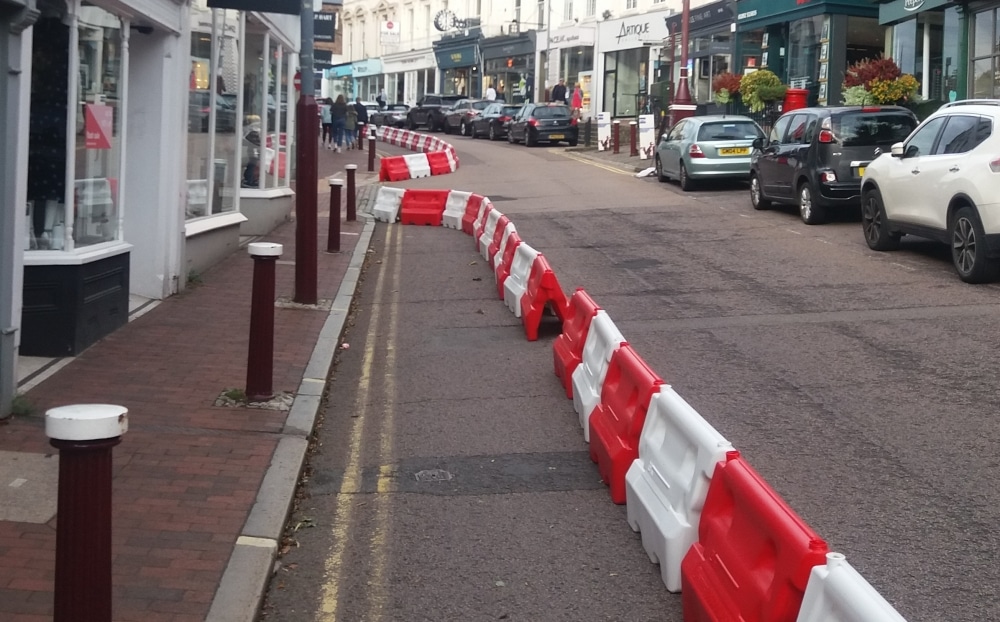Last Thursday [August 27], plastic barriers were erected down the High Street to widen the pavement as the road became a one-way system.
Tunbridge Wells Borough Council [TWBC] say the scheme is ‘only a trial’ and is being funded by Kent County Council [KCC] as part of the government’s ‘active travel’ initiatives.
County Hall was allocated just over £8million by the Department for Transport to invest in schemes across the county to encourage walking and cycling in the wake of the Covid pandemic, but it is dependent on the first round of funding – £1.6million – being spent by mid-September.
While TWBC say there is no fixed date on how long the trial will last, Kent County Council placed an order on the road that could mean it could stay for up to 18 months.
Initially, the Council had wanted the one-way system to run down the hill, with traffic entering from Mount Pleasant, but KCC had told the Council the no right turn sign at the bottom of the High Street would lead to congestion, so TWBC changed the direction of the one-way scheme.
In order to allow more social distancing in the wake of coronavirus and allow restaurants and coffee shops to have more space for outdoor eating and drinking, plastic barriers have been installed down the road.
But the changes have caused concern with residents, traders and disability campaigners.
When the barriers, which are more commonly seen on road works along motorways, were installed last week, residents took to social media to complain the red and white dividers were ‘ugly’, ‘unsightly’, and ‘unwelcoming’.
And traders argue the changes were done with no consultation with local businesses in the area.
Karen Webb who runs children clothing shop, Polarn O Pyret on the High Street said: “We have had absolutely no consultation about this. We have heard nothing from the Council about it.
“What happens when we have a delivery? It will block the entire road. The one-way system will see people who are unable to park just drive off rather than come back down the hill. It is difficult enough as it is to park here.”
She continued: “There just doesn’t seem to have been any research done on it. I would have thought the least the Council could do would have been to come around and ask us what we thought.
“I’m worried about the effect this is going to have on trade, but I suppose we will have to just see.”
Lionel Shell, who co-founded Tunbridge Wells’ Jazz on The Pantiles said the barriers have ‘created a wall’ [see letters page 16].
“If you wish to visit a shop you have to hurdle over or walk many metres around it,” he said.
“What are they trying to do to this town? Surely, a little common sense, if they wish to widen the pavements, all they need to do is simply remove the iron bollards.
“It would be lovely if the footfall was so great that we needed wider pavements.”
Others are concerned the barriers will cause issues for disabled people.
Chris Jeffery, a former Trustee at Shop Mobility and campaigner for Mend the Gap, which is trying to get working carers paid leave, says the changes will cause issues for wheelchair users. He told the Times: “The One Way sign halfway down actually blocks the pavement for anyone in a wheelchair or mobility scooter, and this should have been taken into consideration by those who instigated this plan.”
He continued: “The direction of traffic should have been the other direction to avoid the problems getting out at the top of the High Street.”
Tunbridge Wells Borough Council admit the scheme is ‘not very attractive’ and that they have been unable to ‘carry out the levels of engagement and consultation that we would usually expect to do’ because of the short timeframe KCC had to implement the changes.
Council Leader Alan McDermott told the Times: “The Government told councils that the money for the Emergency Active Travel schemes must be spent by September 18 and as a result KCC has implemented this scheme in a very short time.
“My view is that it isn’t very attractive but it is temporary and the barriers mean it is flexible so can be adapted to different requirements if needed.
“The scheme creates a safer environment and the wider pavement on the barrier side of the road means people can more easily stay social distanced, and hospitality businesses have the option to place extra tables outside their premises.
“Council officers are keeping the scheme under review and they are very happy to hear from residents and businesses who may have a view about it.”








